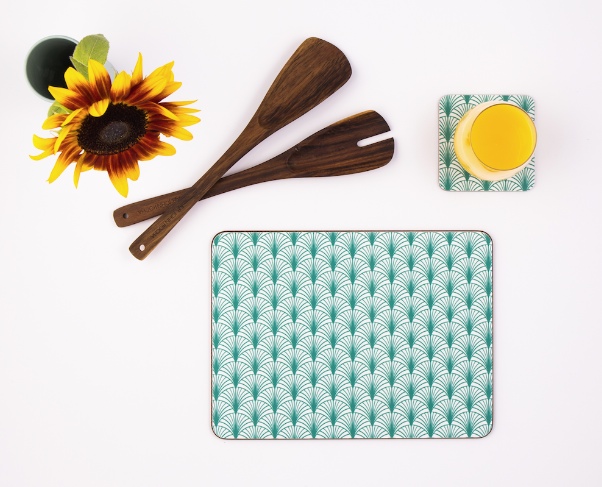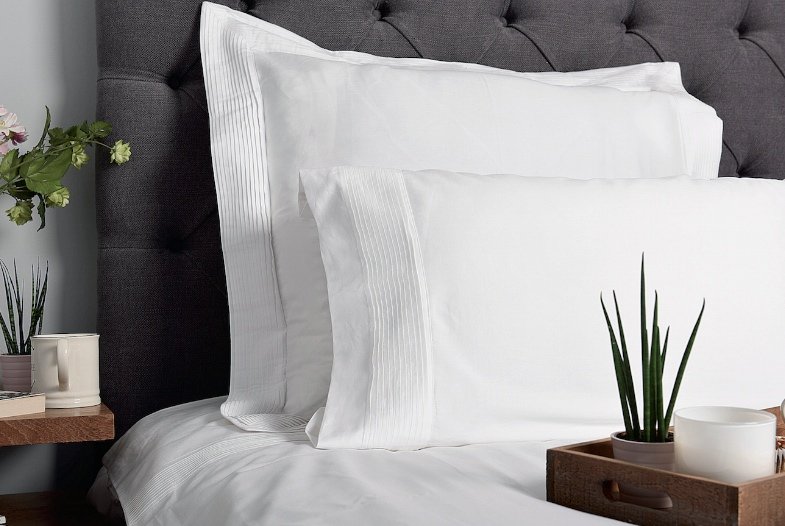The story behind the steady rise of ethical homeware and why it’s the next frontier in sustainable shopping

Did you know that the global fashion industry is on track to consume over a quarter of the world’s annual carbon allowance by 2050?
Stella McCartney does and she’s been travelling the world with sailing wonderwoman Dame Ellen MacArthur shouting about it for the last couple of years now. Perhaps that’s why so many more people are starting to wake up to the consequences of their online shopping habit from “fast fashion” websites, where delivery is free but the environmental impact costs the earth, and underpaid workers in the developing world working inhumane hours to produce T-shirts for pennies.
Yet we don’t think about these issues when we buy a cushion from the high street and the implications can be just as harmful to people and planet. The simple fact is, there isn’t a Stella McCartney figure willing to shout about eco-lamps and we buy a lot more clothes than we do cushions, so it’s not a consumer choice we’re confronted with very often.
“We saw firsthand the abhorrent practices, like child labour and modern slavery, that are rampant”
“Your whole mindset when you’re buying something for your home is completely different to fashion,” says Eleanor Nadimi, the founder of ethical homeware company One Nine Eight Five. Nadimi used to work for H&M in Stockholm before returning to the UK to set up the business – named after the year she was born – selling cushions, throws, furniture and wall art.
“H&M itself, for the high street, is great at being mindful of what they’re doing, but you can’t escape the volume that those things are being produced at. There’s nothing they can do to make that smaller because they’re a high street brand. For me, I wanted to make things that lasted, that people cherished, not something you wear once or buy on a whim.”
Nadimi is part of a niche, but growing, movement within homeware that is turning its back on unethical labour practices and unsustainable manufacturing. Most of her designs are handdrawn, altered digitally, then made by small suppliers in the UK. She’s particularly passionate about supporting the British manufacturing industry, using velvet from the one of the last homegrown velvet suppliers in the country and working with recycled fabrics wherever she can – which sometimes means picking up the fashion industry’s cast offs.
“I work with a mill in Lancashire and they have a really good relationship with a fashion factory who share any leftover or end of run fabrics and they use that yarn to weave our blankets,” Nadimi says. “The implication of not using these manufacturers is massive. I’m only a small business, but it’s the small guys that are going to be the ones that grow and sustain everyone else eventually.”
Another fashion-to-homeware refugee is Cat Thorogood, who became disillusioned while running a ski and snowboarding menswear brand. “We wanted to go into shops and say ‘our t-shirts will cost you £12 to buy wholesale’ and they were like ‘we’re not going to pay that because we can buy a T-shirt wholesale for £2’, so we ended up making a lot of stuff in China, which never really sat comfortably with me,” she says.
“If you make something in the UK, you can visit suppliers and know that it’s genuine. But with China, unless you’ve got a lot of money to go and visit, you have to take people’s word that it’s all OK. Then I watched The True Cost [a 2015 documentary about the global garment industry] and I came out of that thinking I can’t do this anymore. I don’t want to be part of that world.”
Instead, she founded Maik – an old Scottish word meaning ‘equal’ – an online platform selling socks from France, trays from Sweden, alongside tea towels, cushions, placemats and coasters from the UK. They all have impeccable credentials and the company never uses plastic or unrecyclable packaging – even the tape they use to seal boxes is made from paper.
Before you run away thinking fashion is evil and homeware is heavenly, Thorogood explains that the reason her portfolio of products is so eclectic is because it’s so difficult to find decent companies to work with. “I have a whole list of products I’d like to make, and I can’t find manufacturers that tick all the boxes,” she says. “For me, it starts with a lot of research on the internet, a lot of emails and phone calls and then asking for certificates. I’ve been trying to find people to make bed linen and every time I ask to see certificates for organic cotton, the conversation completely stops.”

Ara Living Malabar pillow case set, £30-35
Perhaps she needs to speak to Himanshi Rastogi, co-founder of Ara Living, an ethical bed linen company. The name is an amalgamation of her sons’ names, Arjun and Aryan, the youngest of which has been besieged with allergies and skin conditions since birth. Ironically, her husband Dhruv is a paediatric consultant specialising in allergens and thought natural bed linen could help their son sleep.
“We couldn’t find anything. I mean, we must have spent a good six months looking for anything at all,” Rastogi says. Two and a half years of research later, they set up their company selling 100 per cent organic cotton bed sheets and found out some shocking facts along the way.
Rastogi tells me that cotton is the most water-hungry plant on earth, using up seven times more water than any other crop. It’s also responsible for 25 per cent of the world’s insecticides and more than 10 per cent of the world’s pesticides, again, more than any other crop. “These toxins seep into the eco-system and they severely harm our waterways, our wildlife, our farm animals and farm produce so it has a very long term impact.” Quite apart from ethics, organic cotton also lasts three times longer than its non-organic alternative, meaning your bed linen will stay fresh for nearly 10 years rather than three.
But it wasn’t just the environment or even her son’s allergies that motivated Rastogi to start an ethical business; it was her upbringing in India close to the textile factories we hear about yet never really remember when shopping on the high street.

Hexagon wall mirror/terrarium by House of Kind, £40
“We saw firsthand the abhorrent practices, like child labour and modern slavery, that are rampant,” she says. “If you grow up in that part of the world, you kind of take it in your stride, you don’t really question it because that’s how things operate. Having moved to the UK 10 years ago, I knew that whatever I did in life, it would have to be something that made a difference to those people further down the chain.”
Like Thorogood, Rastogi felt that taking the word of remote factories was not the way forward, so she set up her own supply chain from scratch. She travelled to India, found small family-run organic cotton farms and has ensured that every link in the chain – from the pickers to the weavers to the sewers – are Fair Trade certified, paid higher than the Government’s minimum wage, get community benefits, pensions and scholarships for their children. “All of these things we take in our stride in the developed world, but none of this is present in developing countries so I purposefully went and vetted each and every part of our supply chain.”
Rastogi also signed a charter committing 10 per cent of Ara Living’s net profit to Hope for Justice, a UK-based charity that aims to eradicate modern slavery and human trafficking, which is the second largest form of illegal income worldwide, second only to drug trafficking.
“Homeware tends to lag behind because it’s not as much of an impulse buy as fashion,” says Rastogi. “But we need more brands to start thinking about this. The US and Australia are leading the way when it comes to more sustainable and ethical homeware, I think the UK is slightly behind, but we’re going in the right direction, so I’m filled with hope.”
And she isn’t the only one sacrificing profits for a charitable cause. Nadimi from One Nine Eight Five has created a collection for Beat, the UK’s eating disorder charity, donating 15 per cent of sales to the cause in memory of her aunt who died from anorexia nervosa in her late 40s. The loose sketch of a woman, available on a cushion, as a print and as a throw, was handdrawn by Nadimi’s mother.
“Having an ethical brand is harder work than having a non-ethical brand”
“Seeing how that affected my family and the mental health impact it had on my aunt and, indirectly, on the people around her, it was such a powerful disease and you feel so powerless to help the person… It’s a really complex thing and, when I started One Nine Eight Five, I wanted to do something to spread awareness.”
Another homeware brand giving back is House of Kind, founded by former retail buyers Catalina Martin and Raina Marwaha, who were exhausted by the fast turnover of collections and forward planning for Christmas 2025. The friends became vegan around the same time and decided to set up an eco and animal friendly homeware brand to make it easier for busy people to make ethical purchases.
What’s meaty about a candle, I hear you ask? Well, lots of them use beeswax and are filled with all sorts of chemical nasties. Similarly, conventional cushions are stuffed with bird feathers and there are certain dyes used in furnishings that are tested on animals. That’s why House of Kind merchandise only sells products made with natural dyes, stuffs its pillows with non-plastic synthetics and sells candles made from vegetable wax and recyclable candle wicks.
On the side, it donates a percentage of its profits to Hugletts, a sanctuary that rescues animals from the dairy industry, breast cancer charity Cop A Feel, domestic violence charity Women’s Aid and homelessness charity Under One Sky. It pairs charities up with suitable products – the latter charity receives 20 per cent of the sales from a Phases of the Moon print – to remind customers where their donations are going.
But the real challenge, explains Marwaha, is convincing mainstream consumers that ethical homeware isn’t all friendship bracelets and hessian bags. “I think a lot of it is still associated with being very hippy,” she says. “And I don’t think there’s anything wrong with that, but it doesn’t suit everybody. We’re for the eco-conscious customer who’s looking to make that change, but we don’t believe you have to sacrifice style or trend to make a kind purchase.”
Cost can also be a deterrent in this financially delicate climate. A survey for Ethical Consumer found that an ethically-made plain white T-shirt was likely to cost you 149 per cent more than one made in less desirable conditions.
“Having an ethical brand is harder work than having a non-ethical brand,” Nadimi says. “I think you have to communicate where you’re putting your efforts and your budget because things cost more if you want to make it in a sustainable way. It’s important people feel they are getting what they pay for.”
While there are many barriers to change, there are still homegrown homeware brands willing to go the extra mile to brighten up the often bleak textile industry. They just need customers willing to support them.
Visit houseofkind.co.uk, araliving.com, maiklondon.com and onenineeightfive.co.uk to find out more